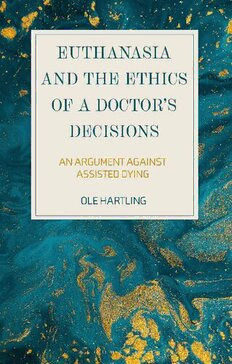
Euthanasia and the Ethics of a Doctors Decisions: An Argument Against Assisted Dying PDF
Preview Euthanasia and the Ethics of a Doctors Decisions: An Argument Against Assisted Dying
i EUTHANASIA AND THE ETHICS OF A DOCTOR’S DECISIONS ii ALSO AVAILABLE FROM BLOOMSBURY A Critical Introduction to the Ethics of Abortion, by Bernie Cantens An Ethical Guidebook to the Zombie Apocalypse, by Bryan Hall Environmental Ethics, by Marion Hourdequin Introduction to Applied Ethics, by Robert L. Holmes Morality and Ethics at War, by Deane-Peter Baker iii EUTHANASIA AND THE ETHICS OF A DOCTOR’S DECISIONS An Argument against Assisted Dying OLE HARTLING TRANSLATED FROM DANISH BY TIM DAVIES, LONDON iv BLOOMSBURY ACADEMIC Bloomsbury Publishing Plc 50 Bedford Square, London, WC1B 3DP, UK 1385 Broadway, New York, NY 10018, USA 29 Earlsfort Terrace, Dublin 2, Ireland BLOOMSBURY, BLOOMSBURY ACADEMIC and the Diana logo are trademarks of Bloomsbury Publishing Plc First published in Great Britain 2021 Copyright © Ole Hartling, 2021 English language translation © Tim Davies, 2021 Ole Hartling has asserted his right under the Copyright, Designs and Patents Act, 1988, to be identified as Author of this work. Cover design by Louise Dugdale Cover image © ivan101/iStock All rights reserved. No part of this publication may be reproduced or transmitted in any form or by any means, electronic or mechanical, including photocopying, recording, or any information storage or retrieval system, without prior permission in writing from the publishers. Bloomsbury Publishing Plc does not have any control over, or responsibility for, any third-party websites referred to or in this book. All internet addresses given in this book were correct at the time of going to press. The author and publisher regret any inconvenience caused if addresses have changed or sites have ceased to exist, but can accept no responsibility for any such changes. A catalogue record for this book is available from the British Library. Library of Congress Cataloging-in-Publication Data Names: Hartling, Ole Johannes, author. Title: Euthanasia and the ethics of a doctor’s decisions : an argument against assisted dying / Ole Hartling ; translated by Tim Davies. Description: New York, NY : Bloomsbury Academic, 2021. Identifiers: LCCN 2020050396 (print) | LCCN 2020050397 (ebook) | ISBN 9781350186224 (paperback) | ISBN 9781350186217 (hardback) | ISBN 9781350186231 (ebook) | ISBN 9781350186248 (epub) Subjects: LCSH: Euthanasia–Moral and ethical aspects. Classification: LCC R726 .H378 2021 (print) | LCC R726 (ebook) | DDC 179.7–dc23 LC record available at https://lccn.loc.gov/2020050396 LC ebook record available at https://lccn.loc.gov/2020050397 ISBN: HB: 978-1-3501-8621-7 PB: 978-1-3501-8622-4 ePDF: 978-1-3501-8623-1 eBook: 978-1-3501-8624-8 Typeset by Newgen KnowledgeWorks Pvt. Ltd., Chennai, India To find out more about our authors and books visit www.bloomsbury.com and sign up for our newsletters. v To my friend, Chris Jephson vi vi vii CONTENTS Foreword by Iona Heath ix Introduction 1 1 The obviousness of the question 7 2 Death as option or destiny 17 Opinion polls on euthanasia 20 3 Active or passive euthanasia 27 Acting and omitting to act 36 Man’s power over life and death 39 The bathtub example 41 4 Medical technology 47 Life is rounded with a sleep 49 5 The two main arguments in the pro-/anti-legalization debate 59 Avoiding unbearable suffering 61 Respect for the right to self-determination 76 Inherent problems of autonomy 88 Autonomy versus paternalism 96 6 Rational versus irrational thinking 99 7 The doctor–patient relationship 109 viii viii CONTENTS 8 The slippery slope 125 9 Solemn arguments 145 Dignity 147 10 The language 155 More recent euphemisms 161 11 Is euthanasia an impossible notion? 167 12 Another possibility 173 A short conclusion 183 Bibliography 185 Index 193 ix FOREWORD Iona Heath Retired general practitioner Former President of the Royal College of General Practitioners Ole Hartling has spent much of his life as a familiar of the dying: he has seen it, touched it, treated it, smelled it, listened to it and endured it. Most of all, he has thought deeply about it. He served as the president of the Danish Council of Ethics for five years and has had a long career as a specialist in nuclear medicine, a discipline that involves the use of radioactive substances in the diagnosis and treatment of life-threatening disease. He has cared for two wives through lengthy terminal illnesses and all of these profound experiences have helped him to understand that the holy grail of self-determination in dying and death is an illusion, and have made him a deeply committed opponent of active euthanasia and physician-assisted dying. I have had the privilege of listening to him and discussing and writing with him. In pursuit of autonomy and self-determination, many of those who argue in favour of assisted dying seem to want to control the process of their dying and the timing of their death; at the same time, they seem to forget that dying is part of living. Joy and despair are perennial not only for the living but also for the dying, and not even the dying can know the precise detail of their future.
